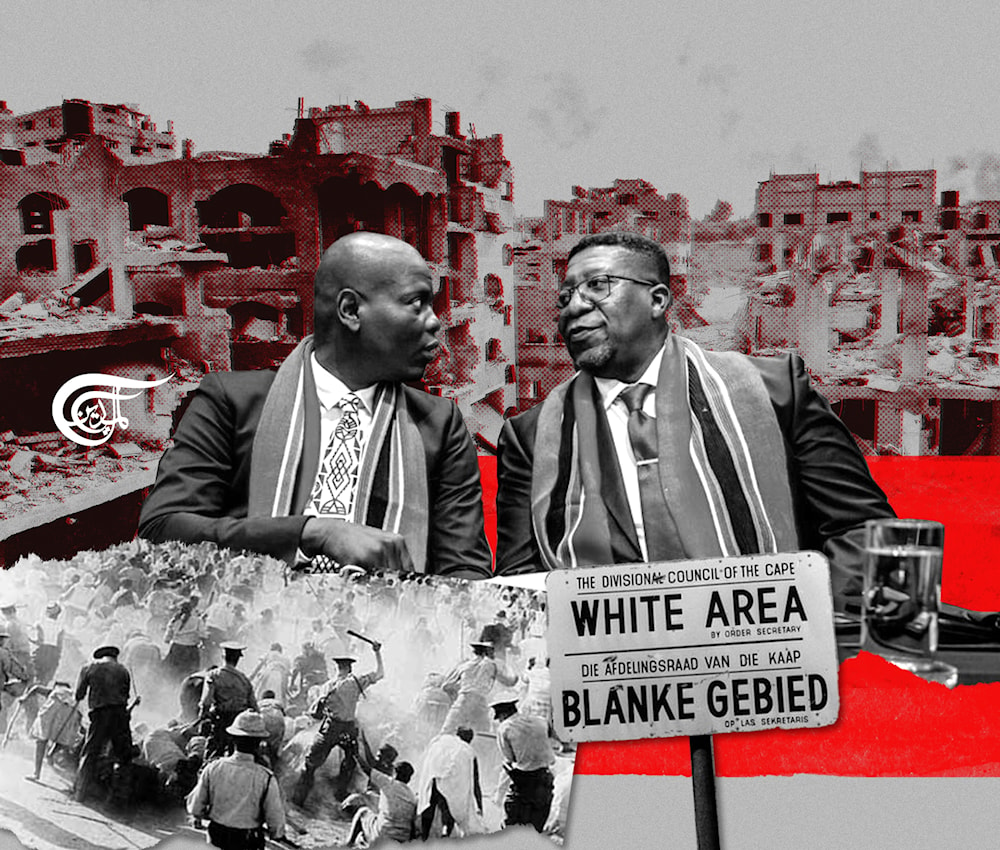The five pillars of South Africa's genocide case against 'Israel'
Acknowledging the necessity of political action does not imply relinquishing the notion of illegitimacy that characterizes "Israel" from the Iranian perspective.
-

The memory of apartheid is still alive in South Africa (Illustrated by Mahdi Rtail; Al Mayadeen English)
The historic genocide lawsuit filed by South Africa against "Israel" commenced last Thursday at the International Court of Justice (ICJ), the tribunal based in The Hague.
During the first day, the South African legal team described the heartbreaking situation of the Palestinian population in Gaza and outlined what the legal team itself characterized as genocidal acts committed by "Israel".
Adila Hassim, a member of the South African legal team, directly accused the Zionist colonial entity of being involved in five genocidal acts:
1. Mass Killings of Palestinians: According to Hassim, the first genocidal act involves the mass murder of Palestinians in Gaza. The lawyer presented the court with images of mass graves where bodies were buried, many of them "unidentified". Hassim also emphasized that over 1,800 families have lost multiple members.
2. Physical and Mental Harm: The second genocidal act committed by the Zionist entity is the physical and mental harm inflicted on the Palestinian population. Close to 60,000 people have been injured and mutilated, most of them women and children, in a place where the healthcare system has collapsed.
3. Forced Displacement and Food Blockade: Adila Hassim stated that the Zionist entity has deliberately imposed conditions that are unsustainable and designed to bring about the destruction of Gaza through the forced displacement of the majority of the population. Similarly, Hassim mentioned the Zionist blockade of food and water in Gaza, leading to widespread hunger. Additionally, the colonial occupation has eliminated the ability to distribute available food by restricting the movement of humanitarian workers.
4. Destruction of the Healthcare System: "Israel's" military attack on the healthcare system in Gaza has made life in the region unsustainable. According to the lawyer's statement, healthcare was already weakened by years of Israeli attacks and is currently unable to cope with the overwhelming number of injured individuals in need of urgent treatment.
5. Preventing the Birth of Palestinians: Hassim explained to the tribunal how the Zionist entity is obstructing the vital treatment necessary for childbirth, effectively preventing births in Gaza.
So far, 14 countries, all located in the Global South, have endorsed the genocide lawsuit against "Israel" at the International Court of Justice. These countries include Brazil, Saudi Arabia, Malaysia, Turkey, Bolivia, Nicaragua, Maldives, Venezuela, Namibia, Jordan, Morocco, Bangladesh, Pakistan, and the Islamic Republic of Iran. Additionally, in recent days, the Arab League, a regional organization consisting of 22 member countries, has declared its support for the South African lawsuit.
Iran's support for South Africa requires a more detailed explanation. The Islamic Republic does not recognize "Israel" as a "legitimate state" due to its status as a "usurping state". In this context, the question arises of how Iran can denounce a "state" it does not recognize.
Here, we can differentiate between the political perspective, where the Zionist entity is viewed as a colonial and oppressive state without legitimacy, and the political reality that asserts the "Zionist state" is committing genocide in Palestine, a situation that must be halted at all costs. Acknowledging the necessity of political action does not imply relinquishing the notion of illegitimacy that characterizes "Israel" from the Iranian perspective.
On the other hand, the historical "irony" cannot be overlooked that it is precisely South Africa that has brought "Israel" before the International Court of Justice. The memory of apartheid, the system of racial segregation and institutionalized discrimination against the non-white population implemented in South Africa between 1948 and 1994, is still alive in the country.
Similarly, the memory of Zionist support for white colonialism in the African country persists, exemplified in the close relationship between the apartheid South African Prime Minister, P.W. Botha, and the then Zionist Security Minister, Ariel Sharon, in the 1980s. At the same time, the African National Congress, the leading party in the anti-colonial struggle led by Nelson Mandela, made it clear about its unconditional support for Palestinian liberation. In the words of Mandela himself: "Our freedom is incomplete without the freedom of the Palestinians."
For nearly 20 years, Pretoria under apartheid and "Tel Aviv" were significant partners in various areas, ranging from trade exchanges to collaboration on nuclear weapons issues. Furthermore, the similarity between both colonial projects from a political perspective cannot be overlooked.
It is precisely this colonial relationship between the two that explains why the authorities of present-day post-apartheid South Africa find parallels between the current situation in Gaza and the one experienced by the South African people at the hands of white supremacism.
Finally, it is necessary to note, albeit briefly, the response given by the Zionist entity to the complaint filed by South Africa. The responses can be summarized in the statements of the Israeli Foreign Minister, accusing South Africa and, in particular, the legal team representing the country before the court, of "sympathizing with Hamas." This again criminalizes the anti-colonial response provided by the Palestinian group.
One can conclude by stating that the Israeli argument, claiming that everything in Gaza is a human shield, turns the entire civilian population into a "legitimate" military target, constituting the central feature of genocide.

 Xavier Villar
Xavier Villar
 5 Min Read
5 Min Read








